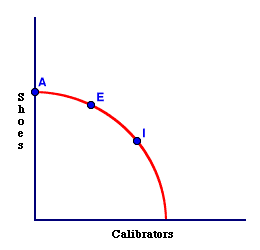
|
|
REGULATORY FORCES: Forces in the marketing environment that depend on various government regulatory agencies that impact how an organization operates on a daily basis. An example is the Federal Trade Commission (FTC), which monitors advertising, deceptive labeling, and false or misleading information. Agencies such as the FTC have powers to enforce regulations through fines and other penalties. Other regulatory agencies are: Food and Drug Administration (FDA), Federal Communications Commission (FCC), Environmental Protection Agency (EPA), and Consumer Product Safety Commission (CPSC).
Visit the GLOSS*arama
|
|


|

|
|
Lesson 4: Production Possibilities | Unit 5: Investment
|
Page: 19 of 24
|

|
Investment is the tradeoff between consumption goods used for current satisfaction and capital goods that expand future productive capabilities.- Investment is not just putting money into the stock market. Investment is giving up current satisfaction to obtain greater future production, usually seen as giving up consumption goods to produce capital goods.
- Education and human capital that increase the productive skills and ability of labor.
- Exploration for mineral or fossil fuel deposits that add to land resources.
- Scientific research that expands technology and resource quality.
- The downside of investment is risk. There is no guarantee that you'll get something tomorrow.
Let's consider this basic tradeoff between capital and consumption.- Capital and consumption are the two basic types of goods needed for investment. If we produce more calibrators (capital), then we give up some jogging shoes (consumption).
- This tradeoff IS the fundamental act of investment. In the graph to the right, if we move from bundle A to E to I, we are giving up jogging shoes and getting calibrators.
We are investing!
|
|
|
|
|

|
|
LAISSEZ FAIRE The notion that government should not intervene into production, consumption, and exchange activities and that the private sector (households and businesses) should be free to make allocation decisions. Laissez faire is a French term that roughly translates into "allow to act." It has been the rallying cry for many people (primarily business leaders) who oppose government intervention, regulation, or even taxation since it was popularized in the late 1700s by Adam Smith in The Wealth of Nations.
Complete Entry | Visit the WEB*pedia |



|

|
|
General Electric is the only stock from the original 1896 Dow Jones Industrial Average remaining in the current index.
|

|
|
"Plans are only good intentions unless they immediately degenerate into hard work." -- Peter Drucker, management consultant
|

|
BACS
Bankers Automated Clearing Services
|

|
|
Tell us what you think about AmosWEB. Like what you see? Have suggestions for improvements? Let us know. Click the User Feedback link.
User Feedback
|


|


